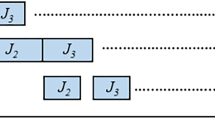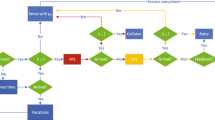Abstract
In this paper, we address the scheduling problem with rejection and non-identical job arrivals, in which we may choose not to process certain jobs and each rejected job incurs a penalty. Our goal is to minimize the sum of the total penalties of the rejected jobs and the maximum completion time of the processed ones. For the off-line variant, we prove its NP-hardness and present a PTAS, and for the on-line special case with two job arrivals, we design a best possible algorithm with competitive ratio \(\frac{(\sqrt{5}+1)}{2}\).
Similar content being viewed by others
References
Y. Bartal, S. Leonardi, A. Marchetti-Spaccamela, J. Sgall, and L. Stougie, Multiprocessor scheduling with rejection, SIAM Journal of Discrete Maths, 2000, 13(1): 64–78.
Y. He and X. Min, On-line uniform machine scheduling with rejection, Computing, 2000, 65(1): 1–12.
H. Hoogeveen, M. Skutella, and G. J. Woeginger, Preemptive scheduling with rejection, Lecture Notes in Computer Science, 2000, 1879: 268–277.
S. S. Seiden, Preemptive multiprocessor scheduling with rejection, Theoretical Computer Science, 2001, 262(1): 437–458.
D. W. Engels, D. R. Karger, S. G. Kolliopoulos, S. Sengupta, R. N. Uma, and J. Wein, Techniques for scheduling with rejection. Lecture Notes in Computer Science, 1998, 1461: 490–501.
L. Epstein, J. Noga, and G. J. Woeginger, On-line scheduling of unit time jobs with rejection: minimizing the total completion time. Operations Research Letters, 2002, 30(6): 415–420.
S. Sengupta, Algorithms and approximation schemes for mimimum lateness/tardiness scheduling with rejection, Lecture Notes in Computer Science, 2003, 2748: 79–90.
R. L. Graham, E. L. Lawler, J. K. Lenstra, and A. H. G. Rinnooy Kan, Optimization and approximation in deterministic sequencing and scheduling, Annals of Discrete Mathematics, 1979, 5: 287–326.
G.J. Woeginger, When does a dynamic programming formulation guarantee the exitence of an FPTAS? INFORMS Journal on Computing, 2000, 12(1): 57–74.
Author information
Authors and Affiliations
Corresponding author
Additional information
The research is supported by National Natural Science Fundation of China under Grant NO. 10671108 and Province Natural Science Foundation of Shandong under Grant NO. Y2005A04.
Rights and permissions
About this article
Cite this article
Cao, Z., Zhang, Y. Scheduling with Rejection and Non-Identical Job Arrivals. Jrl Syst Sci & Complex 20, 529–535 (2007). https://doi.org/10.1007/s11424-007-9050-1
Received:
Revised:
Issue Date:
DOI: https://doi.org/10.1007/s11424-007-9050-1




